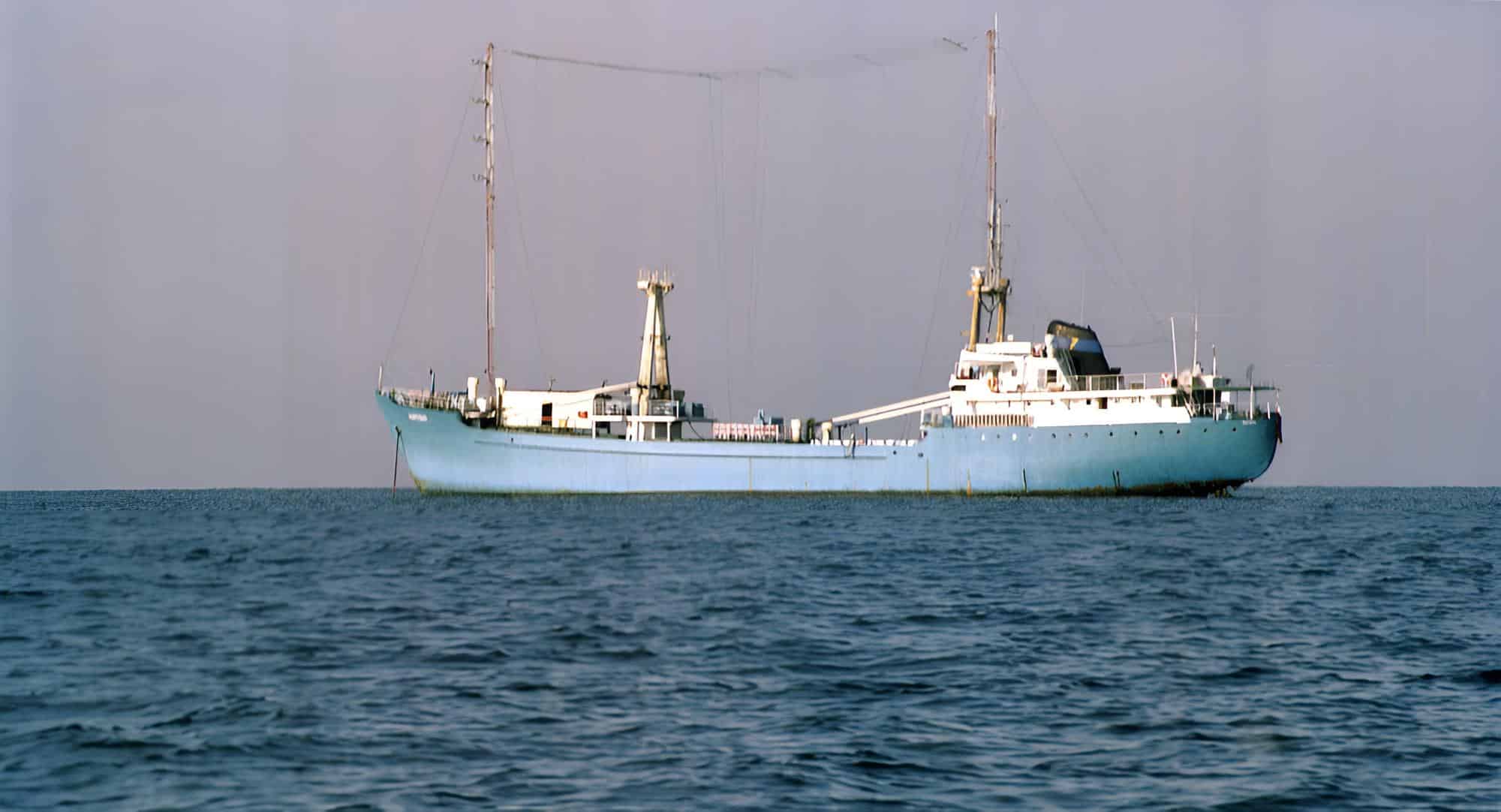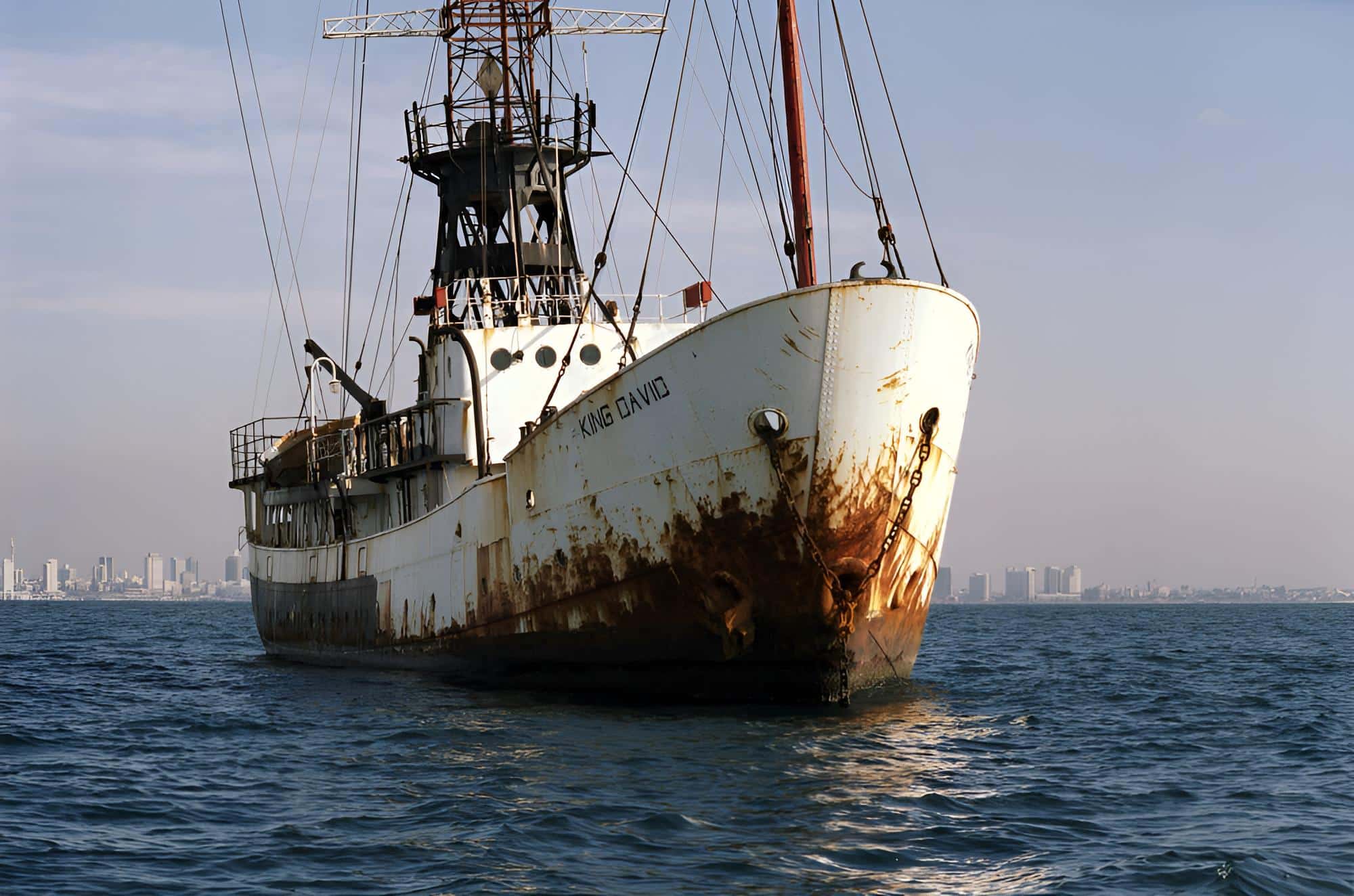The World’s Last Offshore Radio Station(s) – A Trip To Israel
(written by Martin van der Ven in 1999)
After Radio Caroline’s end of her offshore radio history in November 1990, Europe saw only two shortlived offshore stations during this century’s last decennium: Radio Brod operating off the ex-Yugoslavian coast in 1994 and Offshore 98, a one-weekend-only venture at Easter 1999.
But in the Middle East, offshore radio was still going from strength to strength despite Abie Nathan closing down the Voice of Peace and even sinking the MV Peace in November 1993. There were several new stations coming and going (amongst them Arutz 2000 from the King David off Tel Aviv). And Arutz Sheva (having been on the air since November 1988) keeps on broadcasting from the MV Hatzvi until today – it has become the world’s last offshore radio station.
From October 31st until November 14th 1999 I had the chance to visit Israel on a trip that included nearly all of the country’s sights. Having arrived at Tel Aviv’s Ben Gurion International Airport late in the afternoon, the bus drove to our hotel at the coastline. I immediately saw the lights and the masts of the two remaining offshore radio ships, the King David to the left and Arutz Sheva’s MV Hatzvi to the right. The distance between both ships seemed to be about half a mile, and both vessels were lying so near to the beach that there could be no doubt that they are anchored in national waters.
I had taken my radio receiver with me (a Sangean ATS 818 ACS which includes a cassette recorder). In the Tel Aviv Sheraton Moriah hotel you could of course receive a perfect signal from the MV Hatzvi (the King David hasn’t been transmitting for more than two years, but is still anchored off the coast). Arutz 7 is operating two FM and two AM transmitters (1143 kHz and 105.2 MHz for the Hebrew service and 702 kHz and 98.7 MHz for the international service, that mainly means English and Russian broadcasts plus special Torah and Bible programmes). Both on mediumwave and on FM the signal sounded a bit flat and not too well modulated.
You soon realised that Arutz Sheva is a station with a dominating talk radio format including the odd Hebrew folkmusic. They are producing programmes with a right-wing and thus rather radical political content. But close to midnight the international service surprisingly presented a rock programme with Beatles, Dire Straits, Wet Wet Wet, Eric Burdon and The Animals and Bob Dylan songs presented by an American announcer who claimed to be “live” on the air and obviously had some problems with the mixer in the studio.

On Monday morning November 1st you had a fascinating view of both ships from the beach as the sun now shining from the east illuminated the vessels and most of all the blue coloured MV Hatzvi. We went to Haifa on that day. For me that meant no chance to listen to Arutz 7 as our hotel’s roof obviously housed the Radio Haifa aerial which was heavily interfering with all the other FM stations on the dial. Nevertheless this station on 107.5 MHz is quite unique as it’s the former offshore radio station Radio One (broadcasting from the MV Polaris off Haifa in 1991/92) which is now a legalised landbased pop station. You can only compare it with Radio Veronica in the Netherlands or Radio Hauraki in New Zealand. They are using a more European sounding format with Top 40 music and nice jingles.
Our next step was the Sea of Galilee in the northeast of Israel with a rather disappointing Arutz Sheva reception on 1143 kHz (no signal on 702 kHz) and a very weak signal on 105.2 MHz (from a landbased standby transmitter?) which was jammed by two other stations that were very close to Arutz Sheva on the scale. When the sun went down on Friday evening, I realised that Arutz Sheva’s transmitters had closed down due to the beginning of the Shabbat. The station reopened about 25 hours later on Saturday evening. We had travelled to Jerusalem in the meantime where I experienced quite the same problems when trying to receive a proper signal.
On Tuesday November 9th I took the bus 405 from Jerusalem to Tel Aviv to meet Mike Brand, the Israeli offshore radio expert. 42-year-old Mike has been living in Israel for 25 years, and he regrets that there isn’t any anoraky offshore radio scene in the Middle East despite the colourful history of Abie Nathan’s Voice of Peace. Mike had tried to arrange a boat trip but there were only two skippers willing to bring us closer to the remaining boats – and both of them were claiming a large sum of money… It wasn’t easy for Mike to get through Tel Aviv’s traffic and to find a suitable parking place at the beach. Whilst dring he told me that Arutz Sheva’s programmes were obviously recorded on land and were delivered to the boat on tape. The talk shows inlude a lot of phone-ins, speeches and commentaries. Mike wasn’t sure if Arutz 7 ever stopped using several additional landbased transmitters. He told me that he hardly listened to their programmes because of their right-wing content. Only in the early morning they use to play non-stop Hebrew music on their 1143 kHz and 105.2 MHz outlets to attract more listeners. Mike remained doubtful if the station had a realistic chance to get legalised. And Mike didn’t know any reason for the King David (the former Arutz 2000 boat) still anchoring off the coast despite her silence since more than two years. Today Arutz 2000 keeps on broadcasting as a landbased pirate station. “I have no idea at all what they want to do with that vessel…”
Arriving at the Tel Aviv Marina harbour we soon met Mirochenik Elchanan who wanted to have about 150 $ (“including tax”) for a one-hour trip to the boats… To be honest: We didn’t hesitate that long as Mike (who had never been on an offshore radio boat trip before) said, “that’s a chance we won’t have anymore in our lifetime.” So the skipper got his money in the end and offered us a cup of coffee. He told us “journalists” that he was the man in charge to make nearly every tender trip to the MV Peace and nowadays to the MV Hatzvi. Mirochenik estimated that he made about 5000 trips to the Voice of Peace vessel (!). “I know them all, Kenny Page and hundreds of English DJs…” The skipper spoke a mixture of Hebrew (with Mike), English and Dutch (with me) as his wife came from the Netherlands. “Abie Nathan always pretended to have a lack of finance… He kept on lamenting about having no money, and there were times I had to buy rice for the VOP crew out of my own pocket. Sometimes I gave them a part of the Arutz 7 supplies so that they had anything to eat. Abie used to tell everybody he needed money and sometimes only wanted to pay 10 $ for a tender trip. In the end in 1993, he kept on saying he wanted to sink the boat as there was noone willing to help him or give him money. But that simply was a clever trick. The boat was infact a rusting bulk being worth not a single penny. Abie finally managed to get everything off the boat (i.e. the transmitters went to the Palestinians). Only the boat itself remained to get sunk – and Abie avoided to pay the large amount of money to get it scrapped… Later he even had to appear in court but had certain relationships to prevent getting fined…”
Mirochenik Elchanan finally started his speed boat and our trip began. We had lovely summer weather on November 9th (26 degrees, no clouds, few winds), and the Tel Aviv skyline looked beautiful. Within 15 minutes we arrived at the King David which looked rather sad despite her glorious mast. It was an old rusting vessel (with no doubt unseaworthy in the NorthSea), and it seemed that it was manned by just a single person who did not react when we waved at him. Mike was quite proud as in his view we were the very first and only people taking pictures of that ship in (inter)national waters…

Having circled the ship with very low speed the skipper then headed to the MV Hatzvi anchored close in the neighbourhood. Her former name “HAIDUSZOBOSZLO” could clearly be read below the “HATZVI” name. The vessel looked quite nice in comparison. We saw 6 people onboard (two of them being ack) watching us quite friendly and sometimes waving at us. “These are no orthodox religious people as one could suspect,” stated Mike. Mirochenik circled the Hatzvi several times and contacted the obviously well known crew. One of them spontaneously wanted to get off so we drove close to the Hatzvi. Then he jumped onboard our speed boat, taking lots of tapes with him that seemed to have played on the station. “The MV Hatzvi hasn’t been in port for many many months due to security reasons”, told the skipper. We took beautiful pictures and video footage and then went back to Tel Aviv…
Mirochenik was quite proud having got the chance to see his photo published in the internet. He kept on telling us intimate stories… In the end Mike and me were very satisfied to have realised that trip to the last active offshore radio station(s) in the world. When my wife and me flew back from Tel Aviv to Munich on Sunday November 14th we could clearly spot both ships lying off the coast…
